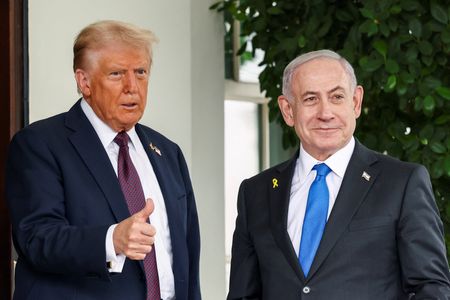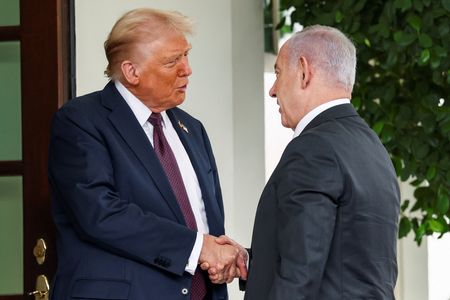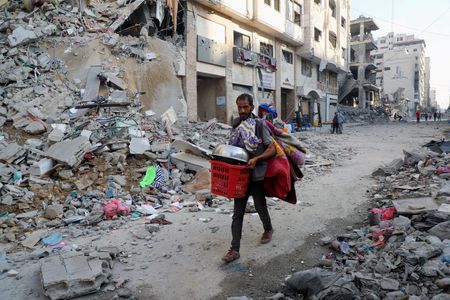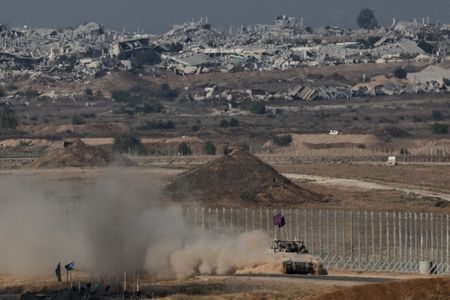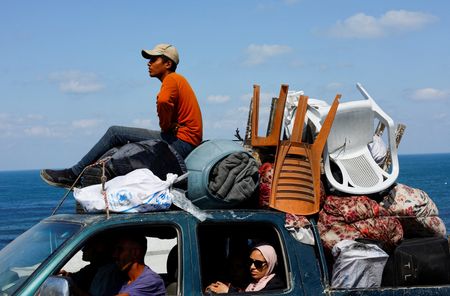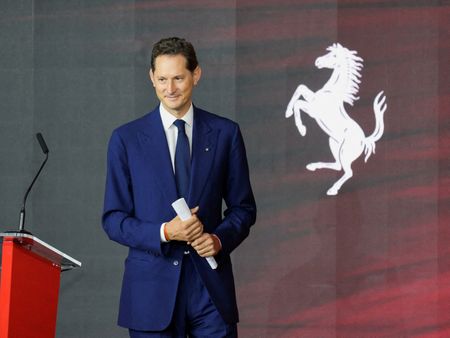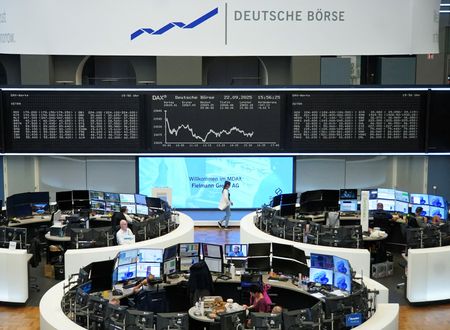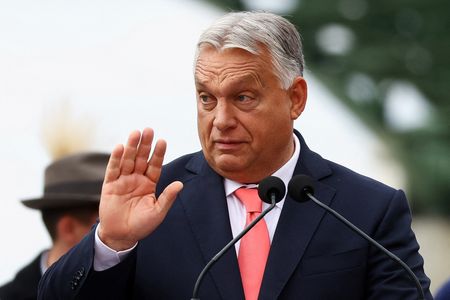By Matt Spetalnick, Trevor Hunnicutt and Nidal al-Mughrabi
WASHINGTON/CAIRO/JERUSALEM (Reuters) -U.S. President Donald Trump hosted Israeli Prime Minister Benjamin Netanyahu for pivotal talks on Monday to press him to back a Gaza peace proposal aimed at ending a nearly two-year-old war that has seen Israel face growing international isolation.
In Netanyahu’s fourth visit since Trump returned to office in January, the right-wing Israeli leader was looking to shore up his country’s most important relationship after a slew of Western leaders formally embraced Palestinian statehood last week in defiance of the U.S. and Israel.
Trump, who had sharply criticized the recognition moves as a prize to Hamas, was seeking Netanyahu’s agreement on a framework to end the war in the Palestinian territory and free the remaining hostages held by the militants.
It marked a stepped-up diplomatic effort by a president who vowed during the 2024 presidential campaign to quickly bring the conflict to a close and has since repeatedly claimed that a deal was near, only for it to fail to materialize.
TANKS HEAD DEEPER INTO GAZA CITY
Washington presented a 21-point peace plan to Arab and Muslim states on the sidelines of the U.N. General Assembly last week, and Trump’s main objective on Monday was to try to close the remaining gaps with Netanyahu.
The White House talks came as Israeli tanks on Monday thrust deeper into the heart of Gaza City, where Israel has launched one of its biggest offensives of the war this month with Netanyahu saying he aims to wipe out Hamas in its final redoubts.
Arriving by limousine, Netanyahu was greeted by Trump outside the White House doors with a handshake, a stark contrast to the chilly reception when he spoke on Friday before the U.N. General Assembly, where scores of delegates walked out in protest.
Asked about the prospects for a peace deal, Trump told reporters: “I’m very confident.”
Though Netanyahu praises Trump as Israel’s closest ally, there are signs of Israeli scepticism over the proposal, as well as some reservations among Arab states. Hamas’ apparent absence from the negotiations has also raised questions.
The plan, crafted by U.S. special envoy Steve Witkoff and Trump first-term Middle East adviser, Jared Kushner, envisions a ceasefire agreement followed by the release within 48 hours of all remaining hostages held by Hamas and the gradual withdrawal of Israeli forces from Gaza.
It also calls for a new dialogue between Israel and Palestinians for “peaceful coexistence” and no further Israeli attacks on Qatar, a White House official said on condition of anonymity. Israel angered Qatar, a U.S. ally, and drew criticism from Trump for an airstrike against Hamas leaders in Doha on September 9.
Previous U.S.-backed ceasefire efforts have fallen apart due to a failure to bridge the gap between Israel and Hamas, and Netanyahu has vowed to continue fighting until Hamas is completely dismantled.
ISRAELI, ARAB CONCERNS
Netanyahu is under mounting pressure from the hostages’ families and, according to public opinion polls, a war-weary Israeli public. But he also risks the collapse of his governing coalition if far-right ministers believe he has made too many concessions for a peace deal.
Two foreign diplomats in the Middle East said Trump’s 21-point plan was less a detailed blueprint and more a set of broad objectives. Israel had objected to several elements and was seeking revisions in its discussions with the White House, they said, adding that Arab states were also seeking some amendments.
However, the diplomats said Arab states had largely backed the plan and were now waiting to see whether there would be significant changes following Trump’s meeting with Netanyahu.
Another source, familiar with the discussions, said Israeli officials had raised concerns with Washington over issues including the proposed involvement of Palestinian security forces in Gaza after the war, expelling Hamas officials from the territory and assigning overall security responsibility.
Sources in Egypt, which has acted as a mediator in ceasefire talks, said Cairo was concerned that the internationally recognised Palestinian Authority should not be sidelined from administering Gaza, and about guarantees that Israel would abide by any agreement’s terms once hostages were freed.
A delegation from Qatar, which has played a key role in previous indirect negotiations between Israel and Hamas, was expected at the White House on Monday for discussions about Gaza, a U.S. official said on condition of anonymity.
(Reporting by Matt Spetalnick, Steve Holland and Trevor Hunnicutt in Washington; Nidal al-Mughrabi in Cairo, Alexander Cornwell in Jerusalem; Writing by Matt Spetalnick; Editing by Peter Graff, Jon Boyle, Aidan Lewis)

